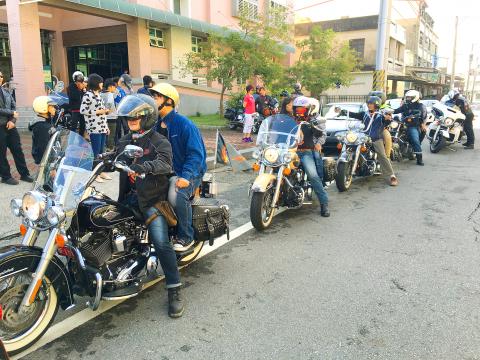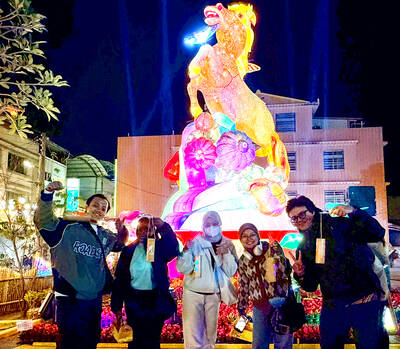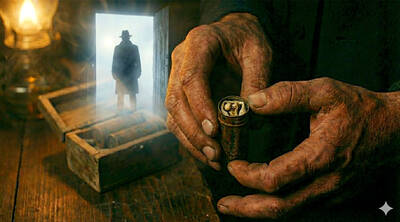On Dec. 12, 30 Harley-Davidson heavy-duty motorcycles assembled at the Taiwan Fund for Children and Families’ (TFCF) Yunlin County Hope Center, where the riders shared their big bike experiences with the students and then gave the children a ride along the Provincial Highway 78 East-West Expressway so that they could enjoy the thrill of riding the wind.
Liao Chih-wen, director of the TFCF’s Yunlin center, says that the Hope Center provides placements for 21 students. He says the center arranges various kinds of art and craft activities to foster the children’s interests, and it encourages the children to take part in walking, hill climbing and road running events so they can have plenty of contact with outsiders, explore new things, absorb other people’s life struggles and experiences and become more competitive in the process.
About 30 members of the Harley-Davidson Free Riders’ Team and the Yunlin Big Bike Association, coordinated by TFCF committee member Lee Mei-hui, arranged to visit the TFCF in Yunlin and spread some good vibes. When one of the students, “Xiao Lin” (not his real name), heard the rumble of the big bike engines, he said his heart was pounding and he felt really excited.

Photo: Huang Shu-li, Liberty Times
照片:自由時報記者黃淑莉
Before the ride, the big bike enthusiasts had a sit-down talk with the students, sharing their experiences of setting up businesses, working, everyday living and riding heavy motorbikes. Then they gave the children a ride on the expressway to find out what it feels like to cruise at speed with the wind in your face. For all the students, this was the first time they had ever ridden big bikes. Most of them felt very thrilled, but there were also one or two students who said it was “a bit scary.”
(Liberty Times, translated by Julian Clegg)
三十部哈雷重型機車十二月十二日齊聚在雲林家扶希望學園,騎士們與學員分享騎重機的經驗,也搭載孩子上台七十八線東西快速道路,享受飆風的快感。
家扶中心主任廖志文表示,希望學園現安置二十一名學員,學園安排各項才藝課程讓孩子能培養興趣,也鼓勵孩子參加健行、登山、路跑,與外界多接觸、多探索、多吸取他們的人生奮鬥經歷,提昇自己的競爭能力。
哈雷自由騎士車隊、雲林重機協會約三十位成員,在家扶委員李美惠居中牽線下,相約到雲林家扶送愛,聽到重機轟隆隆的引擎聲,學員「小林」(化名)說,心臟也跟著碰碰跳,好興奮。
重機車友先與學員座談,分享創業、工作、人生和騎重機的經驗,並搭載孩子上快速道路體驗飆速、飆風的感覺。每位學員都是第一次搭乘重機,多數人覺得好刺激,但也有學員說,「有點恐佈!」
(自由時報記者黃淑莉)

A: Harvard professor Robert Waldinger’s “7-day Happiness Challenge” includes: Day 1: Take stock of your relationships; Day 2: The secret power of an 8-minute phone call; Day 3: Small talk with strangers has big benefits. B: That’s not too hard. What’s next? A: Day 4: Why you should write a “living eulogy;” Day 5: The importance of making work friends; Day 6: Don’t cancel those social plans. B: Good ideas. What’s the final challenge? A: Day 7: Keep happiness going all year long. So, I’m inviting some friends to the Taipei Lantern Festival today to build good relationships. Wanna

★ 本文由生成式 AI 協作,本刊編輯編修。 For tourists looking for a scenic way to spend an afternoon in Kaohsiung, heading to the British Consular Residence of Takao is the perfect choice. Its elevated position allows one to take in the bustling Kaohsiung Harbor to the east and the dazzling sunset over Sizihwan Bay to the west. This elegant red-brick building also serves as a portal to the city’s rich history. Interestingly, for 70 years, many people mistakenly identified this residence as the actual consulate. The history of “Takao,” the former name of Kaohsiung, began its international chapter in the mid-19th century. As European powers

★ Bilingual Story is a fictionalized account. 雙語故事部分內容純屬虛構。 The fog came before the knock. It covered the street and pressed against the window. Chao Gung-dao lit a small oil lamp, but his makeshift hut stayed dim. Another knock. Chao opened the door. The inspector stepped inside and removed his hat. He did not smile. “You remember me?” the inspector said. Chao resented the question. The inspector looked around the small room. His eyes stopped on a wooden box resting on a low beam above Chao’s head. “What is that?” Chao stayed silent. The inspector pulled the box down and

★ 本文由生成式 AI 協作,本刊編輯編修。 Continued from yesterday(延續自昨日) https://www.taipeitimes.com/News/lang Kaohsiung’s deep connection with the sea continues to thrive, with Kaohsiung Harbor remaining a crucial hub for global shipping. In addition to the port, the city has emerged as a major player in another world-class maritime industry—yacht manufacturing, responsible for producing 80 percent of all Taiwan-made yachts. The yacht industry in Taiwan originated in the post-World War II era, when the US military presence in Taiwan provided local boat builders with guidance on making wooden yachts. The resulting craftsmanship was so exquisite that orders soon poured in. In 1977, Taiwan replaced Canada as the main yacht